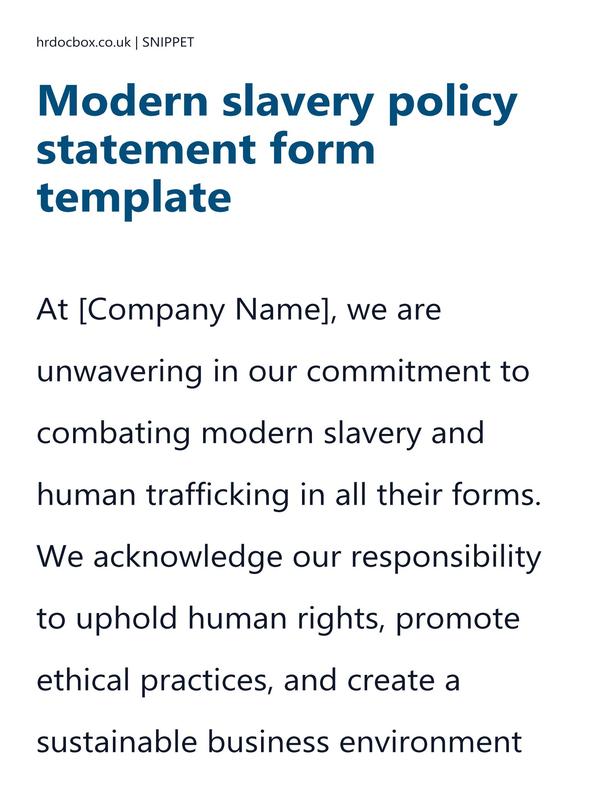Modern slavery policy statement form template


Our Modern Slavery Policy Statement empowers ethical practices, showcasing dedication to responsible conduct and accountability.
- Includes 12 months' access to the Modern slavery policy statement form template, with all updates provided free of charge and notified to you.
- UK-specific accuracy.
- 333 words over 2 pages.
- Last updated 08/08/2023.
- Format: Word / XLS / plain text / email.
- Delivery: Instant download after purchase (no physical item).
- Access: Download link shown here after checkout.
- This Modern slavery policy statement form template will SAVE you up to 1 hour drafting & research, save you money, and reduce your risk.
Modern slavery policy statement
At [Company Name], we are unwavering in our commitment to combating modern slavery and human trafficking in all their forms. We acknowledge our responsibility to uphold human rights, promote ethical practices, and create a sustainable business environment that is free from exploitation.
Our Commitment
We pledge to proactively prevent, identify, and address instances of modern slavery and human trafficking within our operations and supply chains. We stand against any form of forced labour, child labour, human trafficking, and exploitative practices.
Our Approach
-
We will conduct regular risk assessments to identify and evaluate modern slavery risks within our operations
This is a 30% preview of the Modern slavery policy statement form template. For instant full access, purchase this item or a parent bundle.
Modern slavery policy statement form template purpose
A modern slavery policy statement is a declaration of an organisation's commitment to combat modern slavery and human trafficking.
It ensures legal compliance, highlights ethical supply chain practices, and fosters transparency.
By addressing risks and demonstrating responsibility, the statement enhances reputation and encourages industry-wide progress.
Practical application of a Modern slavery policy statement form template
- The Modern slavery policy statement form template should be actioned / delivered as soon as reasonably practical.
- It is sent / delivered by a Company / HR team to a Company / HR team.
Compliance
Compliance
This Modern slavery policy statement form template incorporates relevant UK laws and HR standards, including those listed below:
-
Modern Slavery Act 2015: Requires organisations to create a statement detailing efforts to combat slavery and human trafficking.
-
Equality Act 2010: Upholds equal treatment and human rights, reinforcing the need to address modern slavery.
-
Human Rights Act 1998: Incorporates human rights principles, supporting efforts to prevent modern slavery.
-
Gangmasters (Licensing) Act 2004: Regulates labour supply, aiding in the prevention of forced labour.
-
Employment Rights Act 1996: Protects worker rights and fairness, relevant in modern slavery cases.
-
Public Interest Disclosure Act 1998: Safeguards whistleblowers who expose modern slavery practices.
-
Immigration, Asylum and Nationality Act 2006: Supports efforts to prevent illegal working and exploitation.
-
Health and Safety at Work Act 1974: Ensures safe working conditions, preventing abusive treatment.
-
Data Protection Act 2018 (GDPR): Safeguards personal data, protecting potential victims' privacy.
-
Employment Equality (Age) Regulations 2006: Relevant for age-related vulnerabilities exploited by modern slavery.
-
Employment Equality (Religion or Belief) Regulations 2003: Prevents exploitation based on beliefs.
-
Employment Equality (Sexual Orientation) Regulations 2003: Prevents exploitation based on sexual orientation.
-
Trade Union and Labour Relations (Consolidation) Act 1992: Supports consultation on labour issues related to modern slavery.
-
Protection from Harassment Act 1997: Ensures victim safety in reporting modern slavery.
-
Public Sector Equality Duty: Requires public bodies to consider modern slavery risks in their actions.
Modern slavery policy statement workflow
Modern slavery policy statement workflow
Check which resources should be implemeted before and/or after the Modern slavery policy statement form template, to understand the workflow.
Modern slavery policy
Our Modern Slavery Policy template equips organisations to address regulatory requirements and ethical concerns seamlessly, ensuring responsible practices.
Frequently Asked Questions about a Modern slavery policy statement form template
Frequently Asked Questions about a Modern slavery policy statement form template
-
Can I use the Modern slavery policy statement form template in my small business?
Yes. The Modern slavery policy statement form template is designed to be flexible and suitable for organisations of all sizes, including small businesses and charities. It follows UK employment law best practice, so even if you don't have an in-house HR team, you can confidently apply it.
-
Is the Modern slavery policy statement form template compliant with 2026 UK employment law?
Absolutely. Like the Modern slavery policy statement form template, all of our templates are drafted with the latest ACAS guidance and UK employment legislation in mind. We review and update them regularly, so you can be confident they remain compliant.
-
Can I customise the Modern slavery policy statement form template for my organisation?
Yes, we highlight the areas of the Modern slavery policy statement form template that you need to update with your own details, and where you need to make decisions to suit your situation. This saves you time and ensures that you meet best practice.
-
Do I get instant access to the Modern slavery policy statement form template?
Yes. Once purchased, you'll be able to download the Modern slavery policy statement form template instantly. Templates are provided in editable Word or Excel format so you can customise them easily, and in PDF format for easy sharing.
-
What if I need more help, not just a Modern slavery policy statement form template?
If you're looking for broader support, we also offer toolkits and library bundles that include the Modern slavery policy statement form template, along with other HR templates and policies for fully managing your situation. These may be more cost-effective if you need deeper advice.
-
Why should I use this Modern slavery policy statement form template, and not AI to generate it?
The risk of using a free AI-generated template 'without review' includes your legal exposure, missing context, and no awareness of the wider process, whereas purchasing the Modern slavery policy statement form template from us mitigates that risk.
